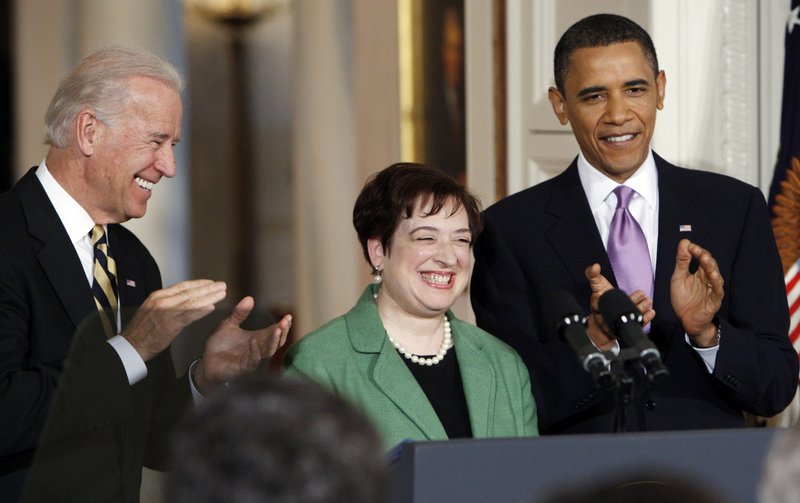WASHINGTON – Activists and politicians aggressively jumped in Monday to define the debate over Solicitor General Elena Kagan’s nomination to the Supreme Court, beginning an argument that may well dominate the summer on Capitol Hill.
choosing his administration’s chief legal advocate for an open seat on the court, President Obama triggered a hailstorm of conservative accusations that he is seeking an automatic vote in favor of his legislative agenda.
On the other side of the ideological spectrum, liberals — while generally supportive — worried whether Kagan would be a reliable counterweight to the court’s conservative majority.
While Supreme Court nominations rev up each party’s political base and the fundraising machinery of interest groups, only the rare one causes an ideological battle that carries much resonance with the electorate at large.
This is not likely to be one of them. So far, observers on both sides of the aisle say they expect the Senate to confirm Kagan, in part because her replacement of Justice John Paul Stevens would not tilt the overall balance of the court.
But this being Washington, and this being an election year, there will be a fight. And the solicitor general’s lack of judicial experience or an easily categorized philosophical identity has already become a point of contention.
That is because, in addition to the hot-button issues that confront any Supreme Court nominee, there is a political context: Kagan, if confirmed, would join the court when it is likely to be considering challenges to some of the most important initiatives of the Obama presidency, including health-care reform, financial regulation and national security. At the heart of many of those cases will be legal questions that go to the very nature and scope of government.
As Obama approached the selection of the person who could become the nation’s 112th Supreme Court justice, he criticized what he describes as a conservative brand of judicial activism, one that he contends is not respectful enough of the political process. Measures passed by Congress and state legislatures should be given “some deference as long as core constitutional values are observed,” Obama said last month.
To conservatives, that kind of rhetoric sounds suspiciously like stacking the deck. “It’s a political process when you’re focused on results. It’s certainly not a legal process,” Jeff Sessions, R-Ala., the ranking Republican on the Senate Judiciary Committee, told reporters Monday. “We need to raise questions, some of us do, about this new ideology of results-oriented, relativistic, post-modern legal concepts.”
Said Carrie Severino, chief counsel and policy director to the Judicial Crisis Network: “Obama wants to pack the court with reliable liberal votes to rubber-stamp an agenda that he knows the American people would not accept.” She added: “What better way than to appoint a loyalist from his own Department of Justice with a thin public record to advance his leftist legacy through the Court.”
In some respects, the president set the terms of engagement in his State of the Union speech last January, when he issued an unusually direct criticism of the Supreme Court and its decision in Citizens United v. Federal Election Commission, which allowed corporate funding of independent election advertising as a form of free speech.
Obama cited that case again Monday in announcing Kagan’s appointment. Her choice of that case as her first to argue before the Supreme Court “says a great deal about her commitment to protect our fundamental rights, because in a democracy, powerful interests must not be allowed to drown out the voices of ordinary citizens,” he said.
Liberals have at times been at odds with Kagan’s stances as solicitor general, especially in cases where the administration has taken an expansive view of executive power.
Many liberal groups expressed their support Monday. Nan Aron of the Alliance for Justice, for instance, issued a statement applauding the nomination and saying Kagan “will bring to the Court a respect for core constitutional values and a willingness to stand up for the rights of ordinary Americans.”
But some in the liberal blogosphere were not so willing to close ranks. “Nothing is a better fit for this White House than a blank slate, institution-loyal, seemingly principle-free careerist who spent the last 15 months as the Obama administration’s lawyer vigorously defending every one of his assertions of extremely broad executive authority,” wrote liberal blogger Glenn Greenwald.
One thing Kagan had going for her is that she already has been confirmed once by the Senate, which approved her nomination as solicitor general in March 2009 on a vote of 61 to 31.
But some of those votes may shift now that she is up for a lifetime appointment, rather than a post in a single administration.
Send questions/comments to the editors.



Success. Please wait for the page to reload. If the page does not reload within 5 seconds, please refresh the page.
Enter your email and password to access comments.
Hi, to comment on stories you must . This profile is in addition to your subscription and website login.
Already have a commenting profile? .
Invalid username/password.
Please check your email to confirm and complete your registration.
Only subscribers are eligible to post comments. Please subscribe or login first for digital access. Here’s why.
Use the form below to reset your password. When you've submitted your account email, we will send an email with a reset code.